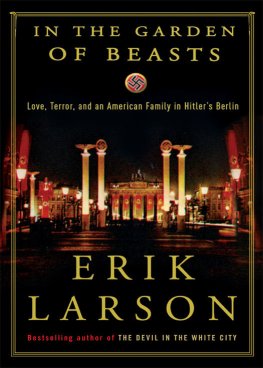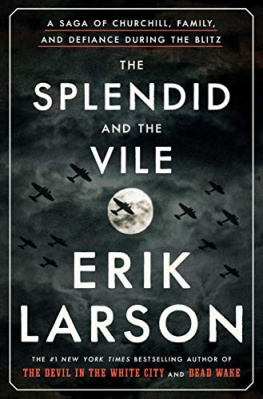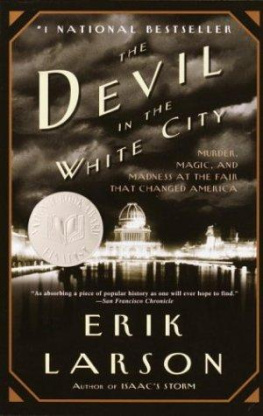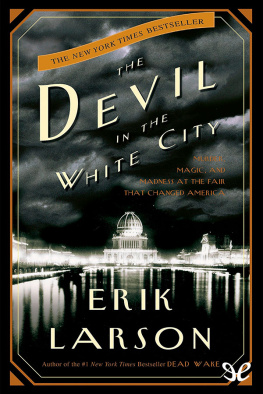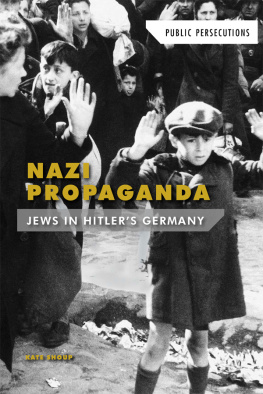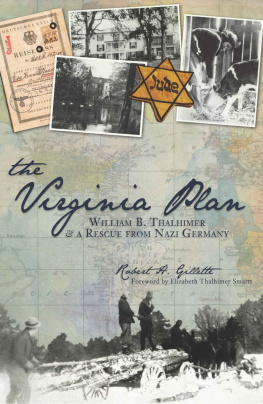Erik Larson
IN THE GARDEN OF BEASTS
Love, Terror, and an American Family in Hitlers Berlin
To the girls, and the
next twenty-five
(and in memory of Molly, a good dog)
In the middle of the journey of our life I came to myself in a dark wood where the straight way was lost.
DANTE ALIGHIERI,
The Divine Comedy: Canto I (Carlyle-Wicksteed Translation, 1932)
I walked across the snowy plain of the Tiergartena smashed statue here, a newly planted sapling there; the Brandenburger Tor, with its red flag flapping against the blue winter sky; and on the horizon, the great ribs of a gutted railway station, like the skeleton of a whale. In the morning light it was all as raw and frank as the voice of history which tells you not to fool yourself; this can happen to any city, to anyone, to you.
Christopher Isherwood,
Down There on a Visit
Das Vorspiel
prelude; overture; prologue; preliminary match; foreplay; performance; practical (exam); audition; das ist erst das ~ that is just for starters
Collins German Unabridged Dictionary (seventh edition, 2007)
Once, at the dawn of a very dark time, an American father and daughter found themselves suddenly transported from their snug home in Chicago to the heart of Hitlers Berlin. They remained there for four and a half years, but it is their first year that is the subject of the story to follow, for it coincided with Hitlers ascent from chancellor to absolute tyrant, when everything hung in the balance and nothing was certain. That first year formed a kind of prologue in which all the themes of the greater epic of war and murder soon to come were laid down.
I have always wondered what it would have been like for an outsider to have witnessed firsthand the gathering dark of Hitlers rule. How did the city look, what did one hear, see, and smell, and how did diplomats and other visitors interpret the events occurring around them? Hindsight tells us that during that fragile time the course of history could so easily have been changed. Why, then, did no one change it? Why did it take so long to recognize the real danger posed by Hitler and his regime?
Like most people, I acquired my initial sense of the era from books and photographs that left me with the impression that the world of then had no color, only gradients of gray and black. My two main protagonists, however, encountered the flesh-and-blood reality, while also managing the routine obligations of daily life. Every morning they moved through a city hung with immense banners of red, white, and black; they sat at the same outdoor cafs as did the lean, black-suited members of Hitlers SS, and now and then they caught sight of Hitler himself, a smallish man in a large, open Mercedes. But they also walked each day past homes with balconies lush with red geraniums; they shopped in the citys vast department stores, held tea parties, and breathed deep the spring fragrances of the Tiergarten, Berlins main park. They knew Goebbels and Gring as social acquaintances with whom they dined, danced, and jokeduntil, as their first year reached its end, an event occurred that proved to be one of the most significant in revealing the true character of Hitler and that laid the keystone for the decade to come. For both father and daughter it changed everything.
This is a work of nonfiction. As always, any material between quotation marks comes from a letter, diary, memoir, or other historical document. I made no effort in these pages to write another grand history of the age. My objective was more intimate: to reveal that past world through the experience and perceptions of my two primary subjects, father and daughter, who upon arrival in Berlin embarked on a journey of discovery, transformation, and, ultimately, deepest heartbreak.
There are no heroes here, at least not of the Schindlers List variety, but there are glimmers of heroism and people who behave with unexpected grace. Always there is nuance, albeit sometimes of a disturbing nature. Thats the trouble with nonfiction. One has to put aside what we all knownowto be true, and try instead to accompany my two innocents through the world as they experienced it.
These were complicated people moving through a complicated time, before the monsters declared their true nature.
Erik LarsonSeattle
The Man Behind the Curtain
It was common for American expatriates to visit the U.S. consulate in Berlin, but not in the condition exhibited by the man who arrived there on Thursday, June 29, 1933. He was Joseph Schachno, thirty-one years old, a physician from New York who until recently had been practicing medicine in a suburb of Berlin. Now he stood naked in one of the curtained examination rooms on the first floor of the consulate where on more routine days a public-health surgeon would examine visa applicants seeking to immigrate to the United States. The skin had been flayed from much of his body.
Two consular officials arrived and entered the examination room. One was George S. Messersmith, Americas consul general for Germany since 1930 (no relation to Wilhelm Willy Messerschmitt, the German aircraft engineer). As the senior Foreign Service man in Berlin, Messersmith oversaw the ten American consulates located in cities throughout Germany. Beside him stood his vice consul, Raymond Geist. As a rule Geist was cool and unflappable, an ideal subaltern, but Messersmith registered the fact that Geist looked pale and deeply shaken.
Both men were appalled by Schachnos condition. From the neck down to his heels he was a mass of raw flesh, Messersmith saw. He had been beaten with whips and in every possible way until his flesh was literally raw and bleeding. I took one look and got as quickly as I could to one of the basins where the [public health surgeon] washed his hands.
The beating, Messersmith learned, had occurred nine days earlier, yet the wounds were still vivid. From the shoulder blades to his knees, after nine days there were still stripes showing that he had been beaten from both sides. His buttocks were practically raw and large areas thereof still without any skin over them. The flesh had at places been practically reduced to a pulp.
If this was nine days later, Messersmith wondered, what had the wounds been like immediately after the beating had been delivered?
The story emerged:
On the night of June 21, Schachno had been visited at his home by a squad of uniformed men responding to an anonymous denunciation of him as a potential enemy of the state. The men searched the place, and although they found nothing, they took him to their headquarters. Schachno was ordered to undress and immediately subjected to a severe and prolonged beating by two men with a whip. Afterward, he was released. He somehow made his way to his home, and then he and his wife fled to central Berlin, to the residence of his wifes mother. He lay in bed for a week. As soon as he felt able, he went to the consulate.
Messersmith ordered him taken to a hospital and that day issued him a new U.S. passport. Soon afterward, Schachno and his wife fled to Sweden and then to America.
There had been beatings and arrests of American citizens ever since Hitlers appointment as chancellor in January, but nothing as severe as thisthough thousands of native Germans had experienced equally severe treatment, and often far worse. For Messersmith it was yet another indicator of the reality of life under Hitler. He understood that all this violence represented more than a passing spasm of atrocity. Something fundamental had changed in Germany.

